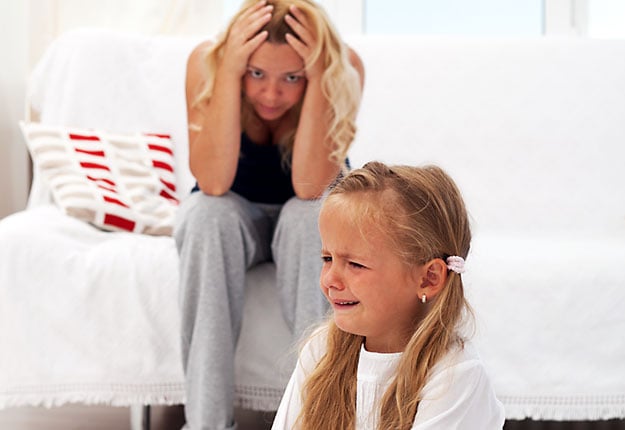Children are feeling more stressed than ever, something which often comes down to increased pressures from parents and schools for them to achieve more, and do more. As parents we are aiming to raise resilient children who will be capable of dealing with stress and challenges thrown their way, and maintain emotional control.
Children and young people need to feel safe, secure and loved and this starts with how they feel at home. Creating a calm home starts with parents setting the example they want their children to follow. Parents should look at themselves as role models, so children learn how to deal with conflict in a considerate manner and behave appropriately and considerately. This behaviour will then be projected on to other people throughout their life.
In 2017, 20% of those aged 15-19 were extremely or very worried about family conflict according to the Australia Research Alliance for Children and Youth.
When children become aware of arguments within their home, they not only worry about the prospect of separation and having to choose sides, but they can feel they are responsible for the conflict. While all parents disagree at times and it is healthy for your child to understand this, they must see you deal with any issues in a considerate way.
Heightened levels of stress at home make children feel unsafe, uncomfortable and unable to cope with the pressures of school and external demands, triggering unease, tantrums and moodiness. If you want your child and household environment alike to be calm, it will start with you and your interactions with your child.
Dr Anna Cohen, Sydney’s leading Clinical Child Psychologist offers parents, methods they can undertake when dealing with their children that will make for a calmer household.
• Don’t get drawn into sibling conflict. When parents are frequently drawn into their children’s arguments, everyone in the family is affected. Parents become frustrated from the pressure to act as a referee and resolve every argument, and children become resentful towards each other and their parents. Teach your children the skills they need to deal with each other in a calm and considerate way and support them in sorting the conflict out between them.
Children need to learn that a disagreement does not have to be an argument. You can disagree and have a different opinion without becoming aggressive and sometimes others will not agree with you and that is okay.
• Remain the in-charge parent and avoid arguments. It is not possible to be an ‘in-charge’ parent when arguing with your child. When feeling hurt or angry, stop yourself from engaging in an immature and destructive situation. Shouting is an approach parent’s use when frustrated, and while in the beginning it may work, as time goes on children tend to stop responding. A child will respond better if they view their parent as rational, considerate, calm, respectful and loving. As a parent you may not be agreeing with your child, but your behavior towards them is saying “I may not agree but I will listen to what you have to say in a calm, considerate and respectful way.”
• Avoid nagging. Parents who find they are endlessly handing out commands and demands without response are likely using requests to their children in a question format such as ‘Can someone help with the dishes?’ This puts it on the child’s terms and acts as a choice that can either be accepted or denied. Instead, look at giving effective and clear instructions, which children are more likely to comply with such as ‘It’s time to come and help with the dishes, thank you.’
• Get your children outside. Children spend more time inside the house than ever before. Encourage your child to go outside and play to enhance their curiosity and creativity, develop self-confidence and enrich their general health and wellbeing. Partaking in outdoor physical activity will also enhance their cognitive functioning, improve their ability to sleep and boosts overall happiness, reducing their stress levels.
• Maintain a consistent routine. Routine helps children feel in control and safe, both of which are key to a coherent household. Children cope better when they are prepared for what is happening over the week, so prepare for the next day the night before, to avoid the stress of a morning rush. Having the whole family understand what they need to be organised and prepared, will ease your children’s anxieties and take the pressure off parents. Regular bedtimes and routines will also be important to ensure your child gets the necessary amount of sleep for their age.
As parents we need to ease up a bit on our children and ourselves. If we can work to respond to our children’s inconsiderate behaviour in a calm and constructive way, it will help them to develop self-regulation and make for a calm and happy household. Remember you are your child’s greatest teacher!
For more information or professional advice contact Sydney’s leading Child Clinical Psychologist, Dr Anna Cohen at Kids & Co. – www.kidsandco.com.au
Share your comments below




















-

-
-
meedee said
- 21 Oct 2022
-

-
-
littlehandsofmine said
- 27 Dec 2018
-

-
-
Blossom said
- 01 Sep 2018
-

-
-
rovermum said
- 20 Aug 2018
-

-
-
rachel1970 said
- 17 Aug 2018
-

-
-
Ellen said
- 15 Aug 2018

-

-
-
mom265671 said
- 14 Aug 2018
-

-
-
mom160421 said
- 14 Aug 2018
-

-
-
mom114371 said
- 14 Aug 2018
Post a comment1:07 pm
8:00 am
11:43 pm
9:15 am
7:10 am
-

-
-
Ellen replied
- 19 Aug 2018 , 4:08 am

Reply7:30 am
4:55 pm
2:38 pm
12:48 pm
To post a review/comment please join us or login so we can allocate your points.